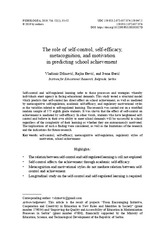Приказ основних података о документу
The role of self-control, self-efficacy, metacognition, and motivation in predicting school achievement
Uloga samokontrole, samoefikasnosti, metakognicije i motivacije u predviđanju školskog uspeha
| dc.creator | Džinović, Vladimir | |
| dc.creator | Đević, Rajka | |
| dc.creator | Đerić, Ivana | |
| dc.date.accessioned | 2021-03-17T13:39:59Z | |
| dc.date.available | 2021-03-17T13:39:59Z | |
| dc.date.issued | 2019 | |
| dc.identifier.issn | 0048-5705 | |
| dc.identifier.uri | http://ipir.ipisr.org.rs/handle/123456789/307 | |
| dc.description.abstract | Self-control and self-regulated learning refer to those processes and strategies whereby individuals exert agency in facing educational demands. This study tested a structural model which predicts that self-control has direct effect on school achievement, as well as mediated by metacognitive self-regulation, academic self-efficacy, and regulatory motivational styles as the variables related to self-regulated learning. The research was carried out on a stratified random sample of 575 eighth grade students. It was shown that the effect of self-control on achievement is mediated by self-efficacy. In other words, students who have heightened selfcontrol and believe in their own ability to meet school demands will be successful in school regardless of the complexity of their learning or whether they are autonomously motivated. The implications of such a finding were considered, as well as the limitations of the research and the indications for future research. | en |
| dc.description.abstract | Pojmovi samokontrole i samo regulisanog učenja odnose se na procese i strategije kojima pojedinac pokazuje agentnost u svom odnosu prema zahtevima obrazovanja. Ovo istraživanje testiralo je strukturni model koji predviđa da samokontrola ima direktan efekat na uspeh u školi, kao i efekat koji je posredovan metakognitivnom samoregulacijom, akademskom samo efikasnošću i stilovima regulisanja motivacije. Istraživanje je sprovedeno na stratifikovanom slučajnom uzorku od 575 učenika osmog razreda (osnovne škole, prim. prev.). Pokazalo se da je efekat samokontrole na postignuće posredovan samoefikasnošću. Drugim rečima, učenici koji imaju povišenu samokontrolu i veruju da su sposobni da odgovore zahtevima škole će biti uspešni u školi bez obzira na kompleksnost njihovog učenja ili toga da li su autonomno motivisani ili ne. Razmatrane su implikacije ovakvog nalaza, kao i ograničenja ovog i pravci za buduća istraživanja. | sr |
| dc.publisher | Društvo psihologa Srbije, Beograd | |
| dc.relation | info:eu-repo/grantAgreement/MESTD/Basic Research (BR or ON)/179034/RS// | |
| dc.relation | info:eu-repo/grantAgreement/MESTD/Integrated and Interdisciplinary Research (IIR or III)/47008/RS// | |
| dc.rights | openAccess | |
| dc.rights.uri | https://creativecommons.org/licenses/by-sa/4.0/ | |
| dc.source | Psihologija | |
| dc.subject | self-control | en |
| dc.subject | self-efficacy | en |
| dc.subject | metacognitive self-regulation | en |
| dc.subject | regulatory styles ofmotivation | en |
| dc.subject | school achievement | en |
| dc.subject | samokontrola | sr |
| dc.subject | samoefikasnost | sr |
| dc.subject | metakognitivna samoregulacija | sr |
| dc.subject | stiloviregulisanja motivacije | sr |
| dc.subject | uspeh u školi | sr |
| dc.title | The role of self-control, self-efficacy, metacognition, and motivation in predicting school achievement | en |
| dc.title | Uloga samokontrole, samoefikasnosti, metakognicije i motivacije u predviđanju školskog uspeha | sr |
| dc.type | article | |
| dc.rights.license | BY-SA | |
| dc.citation.epage | 52 | |
| dc.citation.issue | 1 | |
| dc.citation.other | 52(1): 35-52 | |
| dc.citation.rank | M23 | |
| dc.citation.spage | 35 | |
| dc.citation.volume | 52 | |
| dc.identifier.doi | 10.2298/PSI180202027D | |
| dc.identifier.fulltext | http://ipir.ipisr.org.rs/bitstream/id/167/304.pdf | |
| dc.identifier.scopus | 2-s2.0-85059129349 | |
| dc.identifier.wos | 000462448800003 | |
| dc.type.version | publishedVersion |

